With “Caught By the Tides,” Chinese filmmaker Jia Zhangke has made an elliptical documentary-fiction hybrid whose wide-ranging drama is big enough to encompass most of his previous features (and some of his shorts, too). This non-linear, decades-spanning drama was shot over the course of 20+ years and mostly follows Qiaoqiao, played by Jia’s regular leading lady Zhao Tao, as she chases after her missing lover Bin (Li Zhubin).
“Caught By the Tides”’s plot is incidental to Jia’s keen focus on Qiaoqiao’s environment, which isn’t surprising given Jia’s usual concern with the displaced former residents of the Yangtze River area, from Northern Shanxi to Southern Guangdong.
The development of that area, along with the forced migration of its citizens to make room for the installation of the massive Three Gorges Dam, has been Jia’s recurring concern since at least 2011, when he began filming footage for what eventually became “Caught By the Tides.” Jia’s obsessive attention to anthropological detail makes his latest sprawling feature seem intimate and accessible despite its clear ambitions and occasionally confrontational blunt-ness.
At heart, “Caught By the Tides” is an experimental romantic drama, though that makes it sound unapproachable and a little gimmicky. It’s neither, thankfully, and that’s largely thanks to Jia’s typical focus on the material signs of time’s relentless passage.
Dated technology, both on-camera and the various cameras that Jia used to shoot the movie, helps to distinguish one period from the next. But the plot of “Caught By the Tides” doesn’t flow so much as it snakes through byways of freely associated memories: dancing, eating, and generally following one’s private desires as time and larger cultural forces do what they do.
Qiaoqiao and Bin’s relationship is characteristically unsentimental since she mostly searches for him after they break up. He tries to launch a few money-making schemes since most people in his orbit do what they do to make money, including the social-climbing spa attendant Zhou You (Zhou). So instead of reductively focusing on one tidy story to explain it all, Jia uses Qiaoqiao’s mysterious quest to reunite with Bin to further consider the erosion of the area’s social framework.
More of a collage or a time capsule than a straight-forward, all-in-one story, “Caught By the Tides” gathers and lyrically synthesizes various impressionistic memories of the past so that they don’t get swept up in the country’s merciless rush towards modernization (or something like it).
Jia’s latest begins with documentary footage of a Women’s Day celebration. Several attendants sing bits and pieces of songs, but eventually beg off (“I don’t remember the rest”). Before that, there’s footage from inside a local night club, packed with a range of clients and singers. Afterwards, there’s footage from inside the now-empty Workers’ Cultural Palace.
The Palace’s new owner flatly explains how he makes money despite never charging his customers, most of whom used to work in the area’s coal mines: “I collect money from the women.” And by women, he means the dance hall’s amateur singers, who perform with the same half-invested, half-checked-out smiles that we see Qiaoqiao perform some dances with at various public events.
“It’s all about making money,” says the dance hall’s new owner when he’s asked if the singers enjoy themselves, too. That line resonates all the way through to the end of the movie, when Qiaoqiao runs into an aphorism-spouting robot in a Zhuhai City mall.
Jia’s familiarity with Datong City and the Shanxi area imbues “Caught By the Tides” with a vivid, but lightly held grace that keeps Qiaoqiao’s story in focus without necessarily making the whole movie about her or Bin. The director has known this character and the actress who’s played her since 2002, when Zhao’s character debuted in Jia’s low-key neo-noir drama “Unknown Pleasures”, one of his best-scripted dramas. Echoes of Zhao’s character can also be seen throughout Jia’s filmography, including celebrated standouts like “Still Life” and “Ash is Purest White.”
Thankfully, “Caught By the Tides” is also more than a feature-length Best of collection for Jia, given its rich, evocative imagery and Jia’s nimble assemblage. He draws a thoughtful web of connections between scene fragments, developing a keen showcase for his understanding of how cities like Datong work, having effectively moved their shared, public spaces into simulated/virtual privacy.
Jia skillfully toggles from macro- to microscopic views of his characters and their post-industrial environment with the same unusual lyricism and sensitivity that have come to define his documentary and fictional portraits of China. In retracing his steps throughout “Caught By the Tides,” Jia delivers an expansive, ingenious summary of his project to date.




















